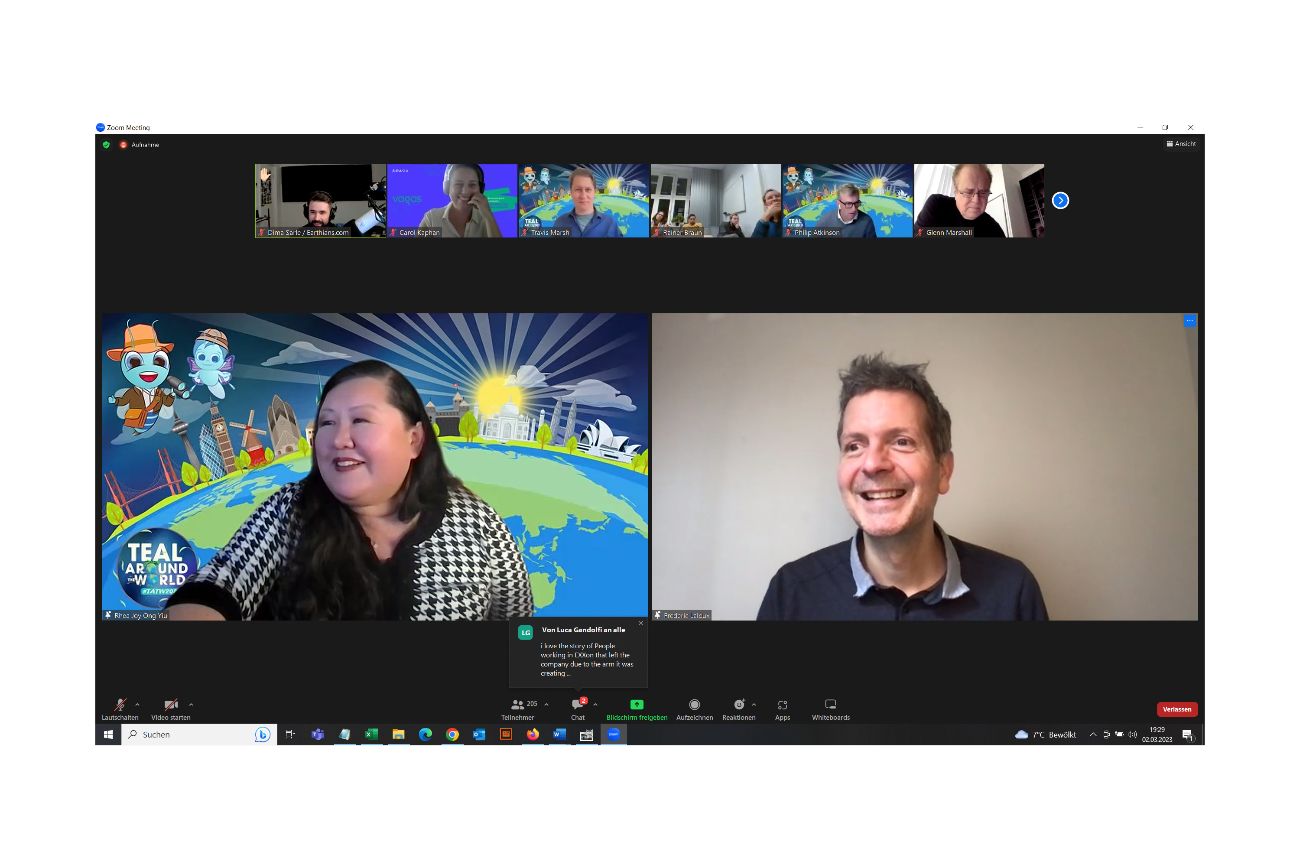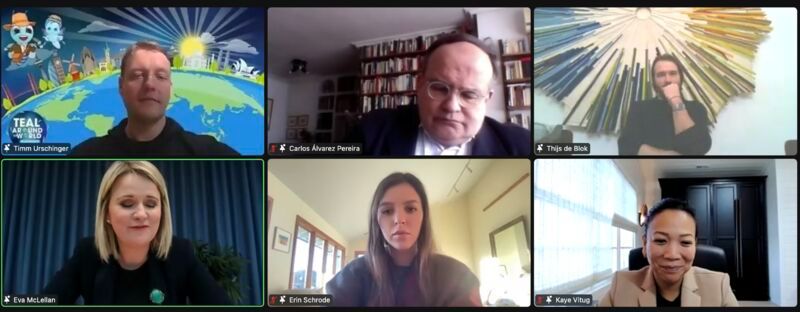All at once, now? How to scale change

Climate crisis and teal organizations
He humbly talks about his professional journey since he started an international movement with his book. In "Reinventing Organizations", Frederic Laloux outlined the ideal of a "teal organization" characterised by holism, self-organization and evolutionary purpose. In the selforganizing and agile context, many still refer to him today. This was also the case at "Teal around the Word", where he was one of 70 storytellers from 24 countries.

When asked what he would rewrite in his bestsellers, Laloux answered, "Not much - most of it is still very relevant today." Only diversity issues and stories of courageous leaders who keep themselves honest instead of chasing a Fake Purpose, he would add. For example, that of Ray Anderson, the founder of the flooring manufacturer Interface: At the end of the 1990s, the convinced industrialist became aware of the extent of climate change and completely geared his company towards sustainability – without knowing how to do it: to completely reinvent an organization.
Worldwide success model self-organization?
Another permanent guest at the "Teal around the World" is Jos de Blok, founder of the care service Buurtzorg from the Netherlands, about whom Laloux wrote in his book. He made self-organization in care a successful model and combined it with a community care approach, across national borders. This time, the well-known entrepreneur was accompanied by his son Thijs de Blok – apparently a generational change is on the cards. "Maybe I am the biggest obstacle to further development," remarked Jos de Blok. He tries to act in such a way that the employees do not take him too seriously. They could talk to him at eye level and also criticise him.
Thijs de Blok took the opportunity to refer to a Harvard Business School case study on Buurtzorg, citing it as proof that self-organization is the future. But he also made clear that this is still a clash of worlds. Unlike in the usual management thinking, there is no best practice in individual teams from which to derive KPIs – a fact, that almost drove the Harvard professors crazy. The common ground is freedom and the confidence to find the best working method for themselves. "It depends on the team - no two teams are alike."
Hopeful beginnings
But to what extent does a new way of working together catch on in larger companies in other sectors? Simona Liguoro, HR Director Italy at Nestlé Nespresso, reported how her 20-person team introduced the holacracy-based approach "Aequacy" in a nine-month process – so successfully that it is now to be rolled out to other parts of the company. The HR team has dynamic roles and focuses on team performance – with the help of OKRs, a transparent feedback system and peer assessment.
Start small – that is the motto of Veit Bergendahl, Head of Clinical Supply Biologicals at Boehringer Ingelheim in Biberach, Germany. In his area, the initial focus was on transparency and openness. The leadership meeting was transformed into an all-team meeting. Later, a common understanding within the whole group was on the agenda to avoid silos. But he warned against too much enthusiasm. Those who expect limitless freedom will collide with corporate reality at some point. "The sooner you know your limits, the sooner you can avoid disappointment."
Every seed helps
Zafer Djabri had to accept a setback. The executive coach of an international financial group recounted the experience of a small group of like-minded people who morphed from a grassroots movement to a pioneering C-level project. "We felt we had no limits. Anything could have been possible," said Zafer Djabri. But a new, performance-driven CEO dashed hopes for the time being. Once the seed is sown, it can always sprout again next spring, the leadership coach commented hopefully. Nevertheless, the story shows how quickly new work initiatives can be blocked by a change of leadership at the top.
Prof. Dr. Antoinette Weibel from the University of St. Gallen and the experienced top manager Otti Vogt have therefore joined forces to bring ideas of moral philosophy into the business world. As a new initiative of their company Good organizations, they announced a "Leadership Society", a platform that combines research, coaching and co-creation. "Leaders need ethical competencies," said Antoinette Weibel. But to scale change, she continued, their personal development must go hand in hand with the development of a company's system and the economy as a whole. "We want to create an institutional mechanism for lifelong learning, an accelerator for leadership," Otti Vogt added.
Together for the climate
Climate change in particular is currently on the minds of the "Teal community". "When CEOs act in public, they have to deliver. They can't say: we don't know what to do," explained Carlos Alvarez Pereira of the Club of Rome in a keynote panel on "Sustainable Leadership". Therefore, more openness is needed to look reality in the eye. Eva McLellan, General Manager of Roche in Slovenia, also called for more participation: the people who work in the system and know it best should be involved. In the health sector, she explained, there are mainly women. "It is no longer acceptable that top leaders do not represent the team."

Laloux is also concerned about the climate issue. Most people are not lacking in insight, he thinks. But if the environment doesn't follow suit, it's easy to push the problems away. That's how the idea to develop a group exchange came about three years ago: The Week. After a beta version, the revised edition is now live. Participants, together with family, friends or colleagues, watch three one-hour films in one week and discuss them together. Didactically, the former McKinsey consultant follows Otto Scharmer's Theory U: Episode 1 is dedicated to reality, Episode 2 explains the connections and Episode 3 focuses on inspiration and joint action. "We are experiencing destruction, but we have a lot of possibilities. The question is which side is faster."
To be continued: On 7 and 8 March 2024, the next Teal around the World will take place.


